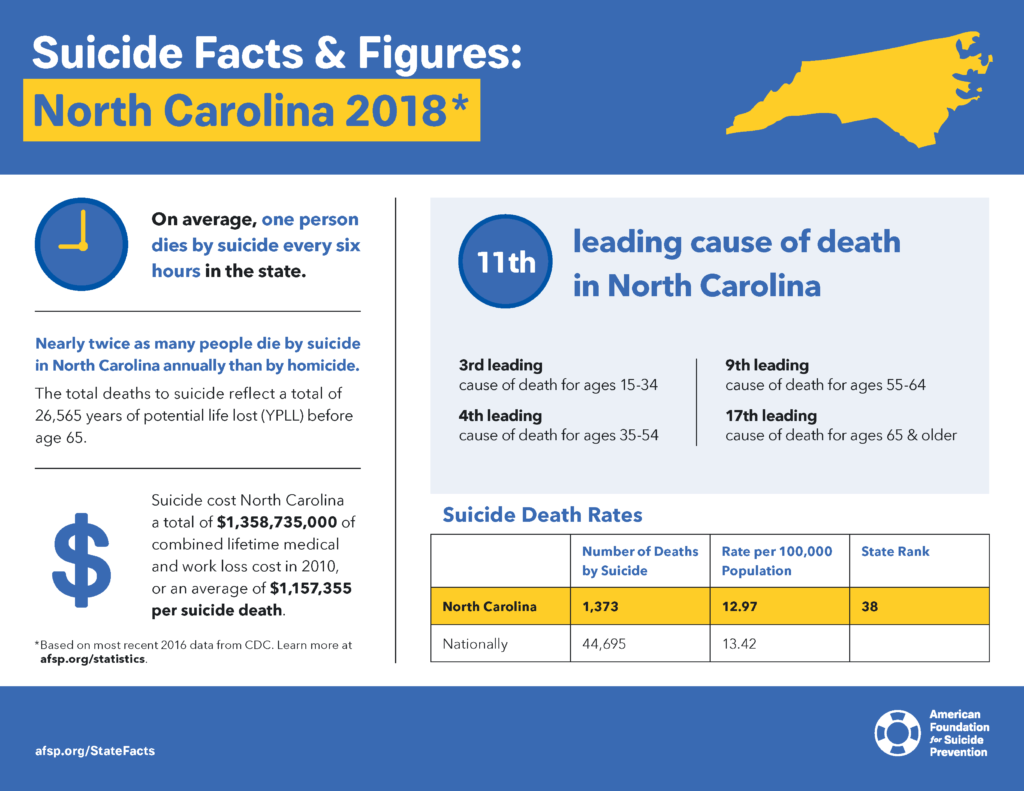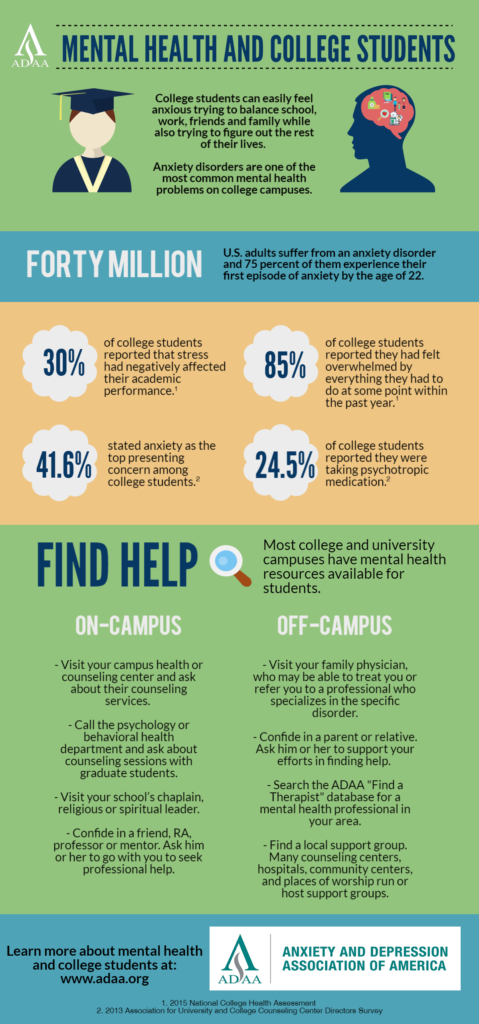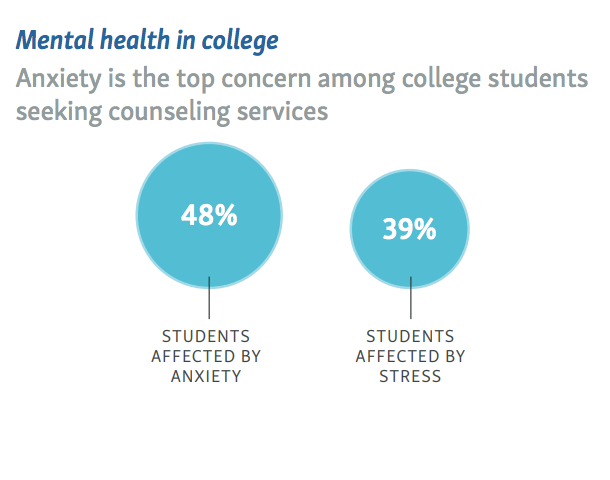The Center for Disease Control and Prevention (CDC) defines mental health as “our emotional, psychological, and social well-being. It affects how we think, feel, and act. It also helps determine how we handle stress, relate to others, and make healthy choices.” And, it is impactful at every stage of life, from childhood through adulthood. However, a person can have poor mental health and not be diagnosed with a mental illness – mental health and mental illness are not one in the same. Still, more than 50% of people will be diagnosed with a mental health illness or disorder at some point in their lifetime; 1 in 5 Americans will experience mental illness in a given year, and 1 in 25 Americans already live with a serious mental illness.
It is easy to see that mental health concerns are prominent with Americans. However, when you bring the scope of concerns to a smaller level, you will see that numbers vary depending on different categories people fall into. For example, in North Carolina, suicide is the 3rd leading cause of death for those between the ages of 15 and 34, according to the American Foundation for Suicide Prevention (AFSP), while nationally, it is the 10th leading cause. College students in particular fall into this age range, and on Western Carolina University’s (WCU) campus, there has been a noticeable increase in the number of students who experience suicidality, according to campus Counseling and Psychological Services (CAPS) Director and Psychologist Dr. Kim Gorman. This was recently addressed by a Out of the Darkness walk on WCU’s campus, presented by CAPS and WCU’s Student Government Association (SGA), which sought to help raise awareness of suicide and reduce its stigma.

North Carolina suicide statistics from the American Foundation for Suicide Prevention (AFSP).
Additionally, according to the Anxiety and Depression Association of America (ADAA), anxiety disorders are one of the most common mental health problems found on college campuses. Forty million adults in the U.S. suffer from an anxiety disorder, with 75% of them experiencing their first episode by the age of 22.

College students mental health infographic from the Anxiety and Depression Association of America (ADAA).
A 2018 Children’s Mental Health Report produced by the Child Mind Institute shows that anxiety has surpassed depression as the top complaint among college students who seek mental health services, followed by stress.

College mental health statistics from the Child Mind Institute’s 2018 Children’s Mental Health Report.
WCU’s CAPS sees approximately 11% of the student population, with depression and anxiety similarly being the top concerns of the clients, which agrees with the top presenting concerns throughout the University of North Carolina (UNC) School System, according to Gorman. In addition to those concerns, clients are typically seen for struggles with relationships, histories of trauma, and suicidality.
While having students using CAPS means student mental health concerns are being addressed, according to Gorman, a counseling center such as CAPS is unable to offer weekly sessions because of the utilization rate of their services. Aside from that, there is no typical length or frequency of time someone may seek treatment at CAPS. However, clinicians do discuss the frequency of treatment with students at the onset of their counseling. Some concerns can be treated fairly quickly in as little as a few sessions, however some students need ongoing and longer-term treatment, in which case CAPS connects those clients with community resources.
Many clients end up seeking treatment with CAPS because another person has suggested they do so, according to Gorman. Usually, this person is a friend. To Gorman, this suggests that students are talking to and providing support for one another when it comes to mental health concerns, and there is an agreement among mental health professionals that individuals are more willing to talk about and seek help for their mental health concerns, despite stigmas that exist.
Additionally, Student Concern Response Team (SCRT) reports are a way someone may be referred to CAPS. According to WCU, the team “utilizes a case-management based approach to actively seek out students having difficulties and/or demonstrating concerning behaviors.” Additionally, the team meets to share information and discuss students that may be in need. SCRT reports can be made by anyone on campus about a potential student crisis, however they are often submitted by university faculty and staff, including Resident Assistants, who are required to report student concerns, such as if a student reports thoughts of suicide. These reports can be instrumental in aiding students with mental health concerns, “if the SCRT team has several reports about one student, that gives us important information about how that student is functioning, or actually how they are struggling to function. Therefore, the more the SCRT team knows, the better we are able to assign that student’s case to a member of the team to do appropriate follow up,” said Gorman in an email response.
While CAPS is able to address the concerns of over 1/10th of the student population, and conversations among individuals about mental health seem to suggest that stigmas are not quite as discouraging to someone who may want or need to seek treatment as they once may have been.
“There is no way to accurately assess how many individuals on a campus have current mental health concerns, as many individuals still experience the stigma about talking about these concerns. Furthermore, there is no hard data that says that mental health is more present now than in years past,” explained Gorman in an email response.
CAPS offers numerous services, in addition to self-help materials they have listed on their website:
- Counseling Services: COPE, Individual counseling, Crisis Services, and Group Therapy, Catamounts for Recovery
- Psychiatric Services (these appointments are billed to the student’s insurance)
- Outreach programs which promote prevention, awareness and skill development with the campus community through events such as programs in residence halls
Additionally, if someone is experiencing a mental health emergency during business hours they can come to CAPS to be seen without having setting up an appointment prior. If someone is experiencing a mental health emergency after business hours, they can call University Police at 828-227-8911 and ask to speak to the Crisis Counselor.
During Spring 2019 WCJ reporters Elise Holbrook, Cami Couch, Jake Burns, Jillian Kasor, Hailee McCraw looked at the issue on mental health at WCU. Bellow are the rest of the stories produced as part of the project. Editor for the project was Keegan Wiggins.
Related stories:



